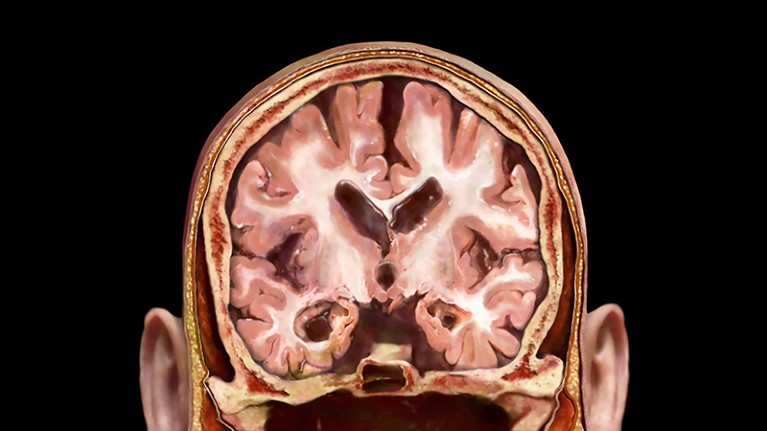Blood
Dementia risk linked to blood-protein imbalance in middle age
A slice through the brain of a person with Alzheimer’s disease, the most common cause of dementia.Credit: Anatomical Travelogue/Science Photo Library
A study that followed thousands of people over 25 years has identified proteins linked to the development of dementia if their levels are unbalanced during middle age.
The findings, published in Science Translational Medicine on 19 July1, could contribute to the development of new diagnostic tests, or even treatments, for dementia-causing diseases.
Most of the proteins have functions unrelated to the brain.
“We’re seeing so much involvement of the peripheral biology decades before the typical onset of dementia,” says study author Keenan Walker, a neuroscientist at the US National Institute on Aging in Bethesda, Maryland.

Conquering Alzheimer’s: a look at the therapies of the future
Equipped with blood samples from more than 10,000 participants, Walker and his colleagues questioned whether they could find predictors of dementia years before its onset by looking at a person’s proteome — the collection of all the proteins expressed throughout the body. They searched for any signs of dysregulation — when proteins are at levels much higher or lower than normal.
The samples were collected as part of an ongoing study that began in 1987. Participants returned for examination six times over three decades, and during this time, around 1 in 5 of them developed dementia.
The researchers found 32 proteins that, if dysregulated in people aged 45 to 60, were strongly associated with an elevated chance of developing dementia in later life. It is unclear how exactly these proteins might be involved in the disease, but the link is “highly unlikely to be due to just chance alone”, says Walker.
“Not all the proteins showed changes in both plasma and brain tissues,” says Nicholas Seyfried, a biochemist and neurologist at Emory University in Atlanta, Georgia. For example, one of the proteins found with the strongest association with dementia risk — called GDF15 — was not detected in the brain, suggesting that “mechanisms below the neck could also play a role”, he adds.
Walker says that although a person’s proteome by itself cannot predict their risk of getting dementia, it could perhaps bolster the strength of existing predictors — such as age and family history.
Protein balance
As expected, some of the proteins that researchers identified are active in the brain — but most have other roles in the body. A handful were linked to proteostasis — the process of carefully balancing protein levels in the proteome.
This regulation is important in preventing proteins from going rogue and clumping together, which is what happens to the amyloid and tau proteins in the brains of people with Alzheimer’s disease, the most common cause of dementia.

How to defeat dementia
The study found altered levels of many of the proteins both in the brain tissues of those who had died with Alzheimer’s disease, and in the blood of those still living with it. These were associated with the presence of amyloid and tau proteins, which suggests they are somehow involved in processes specific to the disease.
Other proteins identified in the study were linked to the immune system, adding to “growing evidence for the role of innate and adaptive immune function in dementia”, says Jin-Tai Yu, a physician-scientist who specializes in dementia at Fudan University in Shanghai, China. Yu and his team have previously found that people with immune diseases are more vulnerable to Alzheimer’s later in life2.
There is still a long way to go in understanding exactly how any of these proteins fit into the physiology of dementia, and a much better understanding of the underlying mechanisms is needed before people can benefit. Such insights “could potentially open doors for early interventions”, says Seyfried. For Walker, the aim in future is to determine whether these proteins could potentially be used as markers to identify various dysregulated pathways in people with dementia and to help provide more personalized treatments.

